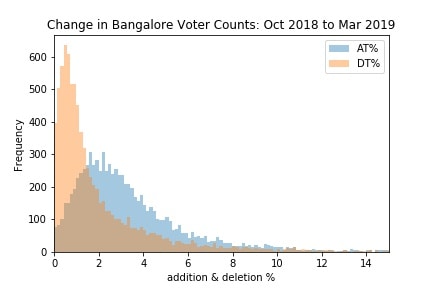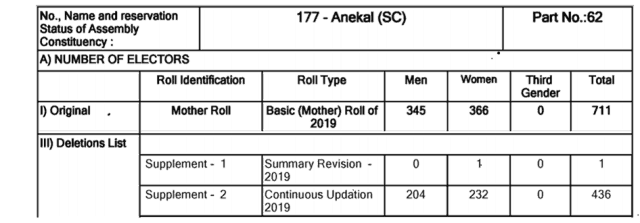The Chief Electoral Officer, Karnataka (CEO-KA), had published on his website the latest electoral rolls – the version that was effective for this Lok Sabha election. Though the mother roll for this election was published last October, an addition/deletion drive was undertaken afterwards.
The rolls with these modifications were published twice – once on 16th January, and the final rolls on 26th March. But the final rolls appeared on the CEO-KA website on 10th April only, leaving little time to respond for those who went missing from the rolls.
Additions
CEO-KA had advertised widely inviting the citizens to register as voters. Unfortunately, officials’ actions on the ground did not match the advertisements, resulting in a loss of faith in the system. After applying, the inclusion of the name in the electoral rolls is a chance event.
Majority of the additions were done in Q1-2019, but thousands of these applications have languished beyond three months without progress. These applicants were not included in the electoral rolls this time, and lost their right to vote in the current Lok Sabha elections. Some affected people have approached the High Court complaining about this.
Conversely, many voters have found multiple entries against their name. These duplicate entries are bloating voter rolls.
Entropy!
Some others are shocked not finding their names in the electoral rolls though they had voted less than a year ago in the assembly elections. Even some celebrities including Kris Gopalakrishnan, the Infosys Co-founder, and the mother of Kiran Mazumdar Shaw, are now excluded from the rolls.
In Election Commission’s push for NERPAP (National Electoral Roll Purification and Authentication Programme), we find paap committed.
Bang-Bang
The table below summarises the data from the last pages of electoral rolls of 8,514 parts of Bengaluru.
| Quarter |
Additions |
Deletions |
||||
| Male | Female | Total | Male | Female | Total | |
| Q4, 2018 | 48,604 | 50,885 | 99,507 | 92,699 | 83,458 | 1,76,191 |
| Q1, 2019 | 1,13,921 | 1,13,155 | 2,27,209 | 14,033 | 12,774 | 26,811 |
The data shows that the CEO-KA had gone on a deletion spree in Q4-2018 and an addition spree in Q1-2019. These activities are based on what the CEO decides rather than what the citizens desire. CEO-KA officials make statements that they cannot delete voters unless form-7 is filed, and cannot add unless form-6 is filed. But the deletions seem to have been done randomly, without form-7 submission or even any verification by officials.
Hence, many Bengalureans who had voted in the last assembly election, and did not submit form-7, were surprised to find their names missing from the rolls. I received calls from many in the city yesterday who went to their booth to vote, and only then realised that their names were missing from the rolls.
Is this bang-bang control appropriate in a social system? Should not the ECI and his officers continuously encourage and facilitate citizens to register, correct data, and delete faulty entries from the rolls, as per ECI directives? With some professionalism and care, maintenance of Electoral Roll Management System can be simplified. The current apathy of the officials has made it seem complex.
Abnormal changes
As per ECI directives, if a part (which corresponds to a booth) finds additions of more than four percent, or deletions of more than two percent, the matter should be investigated. Of the 8,514 parts of Bengaluru, deletions are more than two percent in 2,733 parts, and additions are more than four percent in 2,557 parts. One part has even seen deletions of 61.46 percent voters and another has found additions of 71.26 percent.
Overall, 4,405 parts in the city need investigation – either for excess deletion, excess addition, or both. Such investigations are never done. In the chart below, AT% is total addition percentage and DT% is total deletion percentage; frequency refers to the number of parts.

Chart: PG Bhat
Note: The histogram’s Y-axis shows the number of parts that have a particular addition/deletion percentage (shown in X-axis). Here the limit for X is set at 15 percent, though a small fraction of booths have higher additions and deletions, such as the following.
| Part | Deletion percentage |
| KA1903_1770062 | 61.46 |
| KA1903_1520023 | 50.42 |
| KA1903_1500013 | 44.34 |
| KA1903_1550020 | 40.17 |
| KA1903_1520024 | 38.12 |
| KA1903_1740011 | 38.09 |
| KA1903_1550025 | 37.93 |
| KA1903_1760505 | 37.2 |
| KA1903_1750144 | 36.25 |
| KA1903_1740028 | 35.51 |
| Part | Addition percentage |
| KA1903_1520024 | 71.26 |
| KA1903_1740101 | 67.72 |
| KA1903_1740029 | 59.19 |
| KA1903_1770061 | 58.32 |
| KA1903_1770325 | 47.9 |
| KA1903_1750060 | 46.44 |
| KA1903_1760246 | 43.68 |
| KA1903_1760183 | 42.96 |
| KA1903_1750052 | 41.49 |
| KA1903_1500012 | 40.16 |
Example from Anekal
In part 62 of Anekal assembly constituency, 436 of 711 voters were deleted in Q1-2019. Records in the initial 15 pages are completely wiped out, with the double watermark ‘DELETED’ appearing on those! Reason for deletion? These voters have all shifted residence. An exodus of 436 out of 711 people between this 16th January and 26th March?

For more samples, check these parts with more than 35 percent deletions – AC1520023, AC1500013, AC1550020, AC1520024, AC1740011, AC1550025, AC1760505, AC1750144, and AC1740028 – all at the CEO-KA website.
In 2012, about 13.5 lakh out of about 65 lakh voters of Bengaluru were deleted with reason code ‘S’, for ‘shifted residence’. That was a fake encounter on the innocent voters by CEO-KA. Is it being repeated?
There is no doubt in anyone’s mind that the Election Commission in Karnataka was fighting an uphill battle against local political parties, trying to meddle with the rolls. However, I went through the same system and on the last week of the polls, I made sue my wife’s name was entered in the polls and she voted. I took the trouble to complain to New Delhi Election Commission headquarters and bugged the hell out of the local election commission to make sure I get her election card and her name is on the rolls. I took the trouble as a citizen. I did not depend on somebody else to be sincere to me. The problem with the Bangalore residents is that they don’t care much, in general, whether they vote or not. They would rather spend the holiday in some resort, in a family outing. Country is last in their mind. This is what I have observed in general, though there are a few of us who do care a lot for the country. The young people in general belong to the category of expats. They care two hoots about the country. Hence the bad voter turnout in bengaluru. All they do is complain about potholes and bad roads and garbage etc., but dont care to ensure that they vote for the right person. The rural communities in karnataka did very well because they care about what happens to the country. Urbanites? I have my doubts.
Well said.
There is much more to it than what is visible. My efforts to delete bogus voters listed in my building now being used as commercial premises where there are no voters has been partially successful. It has reduced from 13 voters to 4 voters now over a period of 12 years. I have approached all agencies including the ECI.
If one can visit a bank when there’s a problem with their account tally multiple times, but have never intimated, their change of address duly in time , they should not crib about their names missing.still I mean not everyone who missed because of deletions are at fault.but majority of them are.
As expected the blame game has started on the subject of deletion of names in the electoral rolls. The mistake is partly on the EC and mostly on the voters themselves. EC should have a permanent cell in the head quarters to monitor and concurrent check for addition and deletion of voters. The present system seems to be inadequate.
This time no proper house to house checking of voters has been done before elections.
However EC has given adequate notice to public requesting to check the draft Electoral Rolls, which was available in the net. I have even downloaded the part in which our names were recorded. Voters cannot complain that their names were deleted at random. EC should consider opening of a wing in each ward to attend the work of EC in the City.